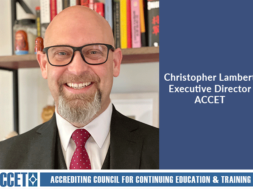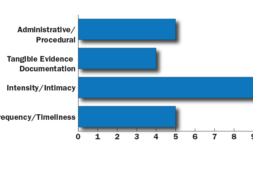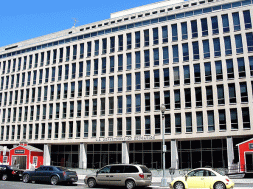
The Impending Crisis for Educational Institutions Accredited by the Accrediting Council of Independent Colleges and Schools (ACICS)
By Wallace K. Pond, Ph.D.
Introduction
In June 2016, one week before the annual National Advisory Committee on Institutional Quality and Integrity (NACIQI) meeting in Washington, D.C., staffers in the U.S. Department of Education submitted a “staff report” to the “senior department official on recognition and compliance” recommending that the Department withdraw recognition for the Accrediting Commission of Independent Colleges and Schools (ACICS). One week later, the NACIQI committee members voted 10 to 3 to also recommend that recognition be withdrawn for ACICS. Based on the protocol established for such situations, the NACIQI recommendation triggered a 90-day period, by the end of which, the Department must make a decision on ACICS’ recognition.
Both recommendations were made in a highly politicized environment following the failure of one the largest private sector college systems in the U.S., Corinthian Colleges, which had been accredited by ACICS. Both NACIQI and the Department of Education staff engaged in deliberations under the influence of strong public statements by congressional members, at least 13 state attorney’s general, activists, and media “demanding” that recognition for ACICS be withdrawn.
As of this writing, the Department has yet to act on the internal staff and NACIQI recommendations, but if the secretary or designated senior official choose to follow the departmental and NACIQI recommendations and withdraw recognition of ACICS, a second, 18 month period would begin in which educational institutions currently accredited by ACICS would continue to operate with provisional access to federal Title IV financial aid, with an opportunity to pursue accreditation with another recognized agency. For its part, ACICS could choose to appeal the decision or pursue litigation in an effort to preserve its recognition. However, short of a Department decision to delay its response to an appeal and/or court action, the clock would continue to run on the 18-month period.
In short, although there are at least a couple of cases in the last 100 years in which recognized accreditors have ceased operations and many cases in which accredited institutions of higher education have migrated from one accreditor to another, the current situation, in which a large accrediting commission, serving hundreds of institutions which enroll nearly a million students in approximately 800 locations and online, may be involuntarily shut down, is unprecedented in U.S. accreditation history.
Moreover, based on conversations with several executive directors and legal counsel for other accrediting commissions, institutions of higher education (IHEs), and professional organizations, there is no existing mechanism to effectively migrate institutional accreditation at the scale and in the time frame that would be necessary in the event that ACICS does, in fact, lose its recognition.
And, in a note of palpable irony, a request made directly to the Department of Education by a professional organization about what special status might exist for institutions who, through no fault of their own, find themselves unaccredited simply because the clock runs out before another accreditor can process an application, the Department’s answer was that “they don’t have the authority” to create such a status. Relatedly, based on conversations with leadership at other accrediting commissions, it is clear that, in the current political climate, there is little benefit and potentially significant cost for finding “creative” ways to assist institutions that are currently accredited by ACICS.
Finally, regardless of what decision the Department makes or when it makes it, many ACICS accredited institutions have come to the conclusion that the current risks inherent in ACICS accreditation are untenable and have taken proactive action to preserve accreditation and its related benefits by initiating the process of applying for accreditation with another accreditor. Due to the highly political nature of the situation and the Department’s established willingness to “let the chips fall where they may” without regard to the impact on institutions and students, a proactive stance on the part of ACICS accredited institutions is almost certainly warranted.
Implications
Institutions of higher education
As noted above, the current situation is wholly unprecedented. Moreover, not only is there no current mechanism for transfer of accreditation at the scale implied by ACICS’ potential loss of recognition, several years ago, the Department of Education released a “Dear Colleague” letter explicitly disallowing agreements between accreditors that would facilitate transfer of accreditation, for accredited institutions, between two recognized accrediting commissions. In short, what this means is that institutions accredited by ACICS, or any other accreditor, would have to follow the entire application process and timeline prescribed for a non-accredited institution seeking initial accreditation. They would also have to meet any and all new criteria of the new accreditor, which could be quite different from their obligations under ACICS.
So far, even in the absence of a decision by the DOE on ACICS’ fate, other accrediting commissions have confirmed “hundreds” of inquiries related to migrating from ACICS to other accreditors.
At least two accrediting commissions have established new “pre-qualification” steps, which although applicable to any institution, are broadly designed to “filter” applications from schools currently accredited by ACICS.
These pre-qualification processes, while helpful for identifying “mismatches” or existing accreditation “problems” early in the process, do nothing to accelerate the application timeline for schools potentially in need of a new accreditor. Moreover, due to the perceived risks by accrediting bodies that would be accepting “refugee” institutions from ACICS, they are likely to be more cautious in the due diligence process than normal, likely extending the time necessary to successfully achieve accreditation with a new accreditor.
One potentially devastating consequence of a decision to withdraw recognition for ACICS is that, during the prescribed 18 month period available to institutions to find a new accreditor, although those schools would remain eligible for Title IV, the institutions themselves would likely be operating under “provisional” status, since their accreditor would no longer be recognized by the Department. In such a scenario, all licenses and approvals an institution has “by means of accreditation” could also be threatened. This might include licensure to operate in some states, some programmatic accreditations, some funding sources, and a variety of other approvals. This situation would also be unprecedented and conversations with attorneys specializing in higher education practice confirm that it could actually be more problematic in the short run than the longer-term loss of accreditation.
Students
As daunting as this reality is for ACICS accredited institutions, the far more profound implications are for the students attending ACICS accredited schools. As of this writing, ACICS accredits roughly 250 institutions, offering programs in approximately 800 locations and online, to roughly 800,000 students. While these students may have little interest in the politics of accreditation, they have great, personal interest in their eligibility for Title IV financial aid, without which over 90 percent could not afford to attend school.
Based on conversations with leaders of accrediting commissions and sector organizations, there is unanimity of agreement that it would be logistically impossible to migrate 250 institutions (and more significantly 800 locations) from ACICS to other accrediting commissions in a period far in excess of 18 months, let alone the prescribed 18 month period, if such a DOE decision is made.
The consensus is closer to three years, and that is if the “migration” effort were already in process, which it is not for many ACICS accredited institutions.
This also assumes that the institutions applying for accreditation with a new accreditor do not have material, outstanding accreditation issues with ACICS, which many do.
More specifically, the requisites of the application process on the institution side combined with application review, workshop attendance, visit review cycle, and staffing on the accreditor side, as currently comprised, could only process a fraction of the necessary applications to accommodate all ACICS institutions. Although the current ACICS membership includes roughly 250 OPEID numbers (which provide access to Title IV), accreditation reviews would extend to hundreds more locations. As one accrediting commission executive director put it, “there simply is not the bandwidth to do that over a few years, let alone 18 months, and some ACICS schools would miss the boat.” Moreover, due to mismatches in scope of accreditation (degree level, program type, etc.), for some ACICS institutions, there would be very limited choices for migration. As such, some accreditors would have to entertain a disproportionate share of applications, potentially lengthening the review process to several years. In some cases, such as with regional accreditors, the required candidacy period (in which institutions with a for-profit tax status may not be eligible for Title IV financial aid), the very structure of the application process would eliminate those accreditors from consideration for institutions in need of a new accreditor.
This reality is of profound potential consequence for students, who are the most innocent of innocents in this situation. If one assumes that half of the students currently attending an ACICS accredited institution find themselves in schools at some point without access to Title IV, what happens to them? If they have to find a new school, are their credits transferable? What would happen to their Title IV benefits? Would they be limited in their future Pell eligibility? What of future enrollments at ACICS institutions during provisional status? Would ACICS accredited institutions be expected to cease enrollments because of the status of their accreditor? Since it would be physically impossible to transfer all ACICS accredited institutions to other accreditors in a time frame far in excess of 18 months, what is the likelihood that affected institutions could execute, en masse, teach out or credit transfer plans and how would students be protected? Even in the presence of thoughtful teach out or credit transfer plans, is there anywhere near the capacity in schools that have successfully migrated their accreditation or in schools who are accredited by a commission other than ACICS to serve what could be hundreds of thousands of students? What happens in communities that do not have other local options?
These are critical questions as it relates to ensuring that students are not penalized as a result of potential Department action against an agency that accredits their colleges and universities. Despite the criticality of the situation, it appears that there is currently no systemic effort on the part of institutions, accreditors, or the Department to ensure that students are protected, should ACICS lose its recognition.
Where would ACICS accredited institutions go?
Based on the candidacy requirements of regional accreditors juxtaposed with potentially misaligned scopes of accreditation with other national accreditors and the very limited time frame to find another accreditor, there are frankly limited choices for schools currently accredited by ACICS.
The accrediting body whose scope of accreditation is most similar to most ACICS accredited institutions, is the Accrediting Commission of Career Schools and Colleges (ACCSC).
For ACICS institutions that do not have existing accreditation “baggage,” are well run, can meet ACCSC criteria, and that have already initiated the application process, it is likely that they could earn accreditation from ACCSC within the next 18 months.
However, this is currently a small minority of all ACICS accredited institutions. Other potential options include ACCET, ABHES, and DEAC, but mismatches in scope of accreditation and/or delivery method severely limit the number of institutions who could be served by these accreditors. The Commission on Occupational Education (COE) would be a good choice for many institutions whose programs are limited to diploma and associate degrees, but due to its regional accreditation roots, COE requires a candidacy period that would likely extend far beyond the 18-month limit for finding a new accreditor.
This is currently a critical point in time for ACICS accredited institutions, since even if their accreditor loses its recognition, the clock has not yet begun ticking on the 18 month timeline. This could be a situation in which literally every day matters to an institution that wishes to maintain accreditation and access to Title IV funds for their students.
The accreditation migration process
Since there is no actual mechanism for transferring accreditation between accreditors at this time, institutions currently accredited by ACICS, or any other accreditor, that wish to “migrate” their accreditation to another commission, must follow the same application process that any institution seeking initial accreditation would have to follow. There is a small exception with something called “Plan B” within the Western Association (ACS WASC), but as a regional accreditor, there are geographic limitations as well as the requisite candidacy period, which effectively eliminate that option.
At a minimum, a college or university in this situation must first determine which accreditor offers the best match between their scope of accreditation and the institution’s programs, degree levels, delivery mode, etc. The second is to conduct a thorough internal audit of all existing potential accreditation challenges, which could include any current accreditation standards that have not been met, reporting requirements, etc. The extent to which any of those can be resolved before a new application is submitted or early in the process could be critical. And, importantly, once an appropriate accreditor is identified, an institution must initiate the application process absolutely as soon as possible so as to increase the likelihood of actually completing the process before their existing accreditation expires, should ACICS lose its recognition. There are also Department of Education1 requirements for any institution seeking to change its accreditor.
Once an application has been initiated, the most important thing a school in this situation can do is to ensure that nothing slows down the application process at a new accreditor once it is started.
Institutions cannot “accelerate” or short cut the process, but they can insure that they do not make mistakes that delay their application, or worse, put them back at the beginning of the line.
Of equal importance is ensuring that the institution continues to meet all requirements with their current accreditor! Regardless of what happens with ACICS in particular, and they may prevail, it is critical to avoid any mistakes that would create risk with an institution’s existing accreditation!
Lastly, an initial application for accreditation, with its concomitant paperwork, self-studies, workshops, data gathering, and visits among other requirements, is far more labor and time intensive and demanding of accuracy and quality than is the process of maintaining accreditation once earned. It is quite likely that it is not possible for an institution to successfully engage in an application for new accreditation while also meeting the needs of existing accreditation, while also maintaining daily operations at a high level with existing staffing and resources. In many cases, a successful migration of accreditation, regardless of the time line, will require incremental resources.
Summary
While one can debate the merits of the internal DOE staff and NACIQI recommendations relative to withdrawing recognition for ACICS, the fact that both recommendations are now in play, in a highly politicized environment in which ACICS has many detractors and few advocates, it is likely that the Department will act on those recommendations to deny ACICS’ petition for re-recognition while simultaneously withdrawing its existing recognition. Similarly, the political context in which both the Department and NACIQI made their recommendations is the same context in which other accreditors are currently operating. As a result, there is very little incentive for any accrediting commission to assert itself, even in the interest of helping innocent students, let alone educational institutions, that find themselves at risk of losing accreditation. As such, combined with the “mad rush” of potentially hundreds of institutions jockeying for a place in line, the process of switching accreditors will likely be more difficult and time consuming now than in would have been in the past.
As noted earlier in this paper, a key factor in the present situation facing ACICS and its accredited institutions is the unprecedented nature of the situation combined with the lack of any mechanism to support the scale of the necessary migration of institutions to other accreditors in any identified time frame, let alone 18 months. Similarly, there is no systemic way for addressing the potentially profound impact on innocent students vis-à-vis teach outs, credit transfers, and financial aid.
Relatedly, the Department has previously demonstrated its willingness to allow substantial “collateral damage” to institutions and their students in pursuit of what it articulates as its responsibility to hold what it defines as “bad actors” accountable. If that continues to be the case, it is unlikely that the Department will play any kind of support role during the process of sunsetting ACICS, if in fact, that is the outcome of the Department staff and NACIQI recommendations.
As such, it is likely that the following will occur:
- The Education Department will act to withdraw recognition of ACICS.
- Current ACICS institutions will have to find a new accreditor regardless of a likely ACICS appeal and/or litigation due to the unknown outcome and lengthy application process with another accreditor.
- Some material number of institutions currently accredited by ACICS will not be able to successfully complete the application process with a new accreditor within the 18-month time line (and likely much longer).
- Some material number of institutions currently accredited by ACICS will cease operations due to the negative impact on retention and enrollment, the organizational stress of attempting to find a new accreditor, and/or the ultimate loss of accreditation and Title IV financial aid.
- Some material number of students will be caught in the crossfire and will be materially harmed as a result of attending a college or university that loses its accreditation and its attendant financial aid and related approvals.
In short, should the Department choose to withdraw recognition for ACICS, in the absence of a thoughtful transition plan that would either allow more than 18 months for institutions to find a new accreditor and/or that provides some sort of transfer of accreditation mechanism for currently accredited institutions that preserves access to Title IV and ancillary approvals by “means of accreditation,” the damage to institutions and potentially hundreds of thousands of students will likely be severe.
In the interim, ACICS accredited institutions should be as proactive and urgent as possible as it relates to pursuing new accreditors, and importantly, as it relates to protecting students with formal teach out and credit transfer agreements should that become necessary. To be clear, these recommendations have nothing to do with the merits, or lack thereof, of the two recent recommendations to withdraw recognition for ACICS. For its part, ACICS strongly believes that it can address and ameliorate identified deficiencies by the middle of 2017. The recommendations stated here are simply based on the realities as they currently present themselves and the concomitant risks to institutions currently accredited by ACICS. Even in the case that ACICS were to “survive” the current crisis, the long-term viability of the organization, as well as the “guilt by association” for some member schools, may be untenable.
For institutions seeking guidance in addressing the current challenges, free consultations are available at http://sandgconsult.com/, Phone: 813-874-0110 or (407) 257-8568, Email: msantoro@sandgconsult.com, g@sandgconsult.com
This white paper can be accessed at: http://www.WallaceKPond.com/accreditation-white-paper
Resources
http://www.ifap.ed.gov/eannouncements/080516GuidanceSchoolSeekingNewAccreditation.html
DR. WALLACE K. POND, for the last 15 years, has been a senior executive in higher education, holding both campus level and corporate positions overseeing large, multi-campus and online institutions of higher education in the U.S. and abroad. He has served as chancellor, president, CEO, and CAO (Chief Academic Officer).
Dr. Pond has been a mission-driven educator for 28 years. He began his career as an adjunct professor and high school teacher and spent six years in the elementary and secondary classroom working primarily with at-risk youth. Wallace was also a public school administrator and spent another six years as a full time education professor and administrator, working in both on campus and online education, bringing education to underserved students. He has also taught as an adjunct instructor at six universities in the U.S. and Europe. Dr. Pond has lived, worked, and studied in North America, Latin America, the Caribbean, Europe and Asia. He has presented nationally and internationally and is the author of numerous articles and the book, The Lights Are On, Is Anybody Home? Education in America.
Wallace, a licensed pilot, has a bachelor’s degree in Spanish, a Master’s degree in Human Resource Education, and a Ph.D. in Education. He has two grown children and resides with his wife and youngest daughter in Colorado.
Contact Information: Wallace K. Pond, Ph.D. // 719-247-0486 // wkpond@comcast.net // www.wallacekpond.com











